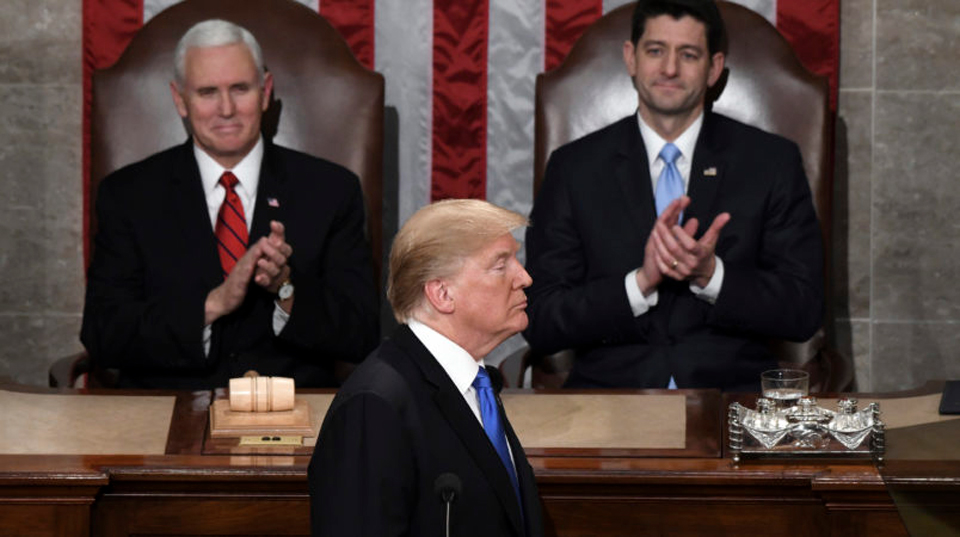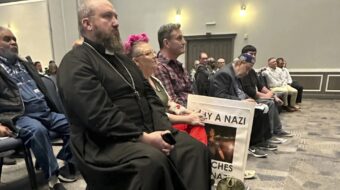
WASHINGTON—Republican President Donald Trump’s State of the Union address got thumbs down on everything from infrastructure to workers’ rights from union leaders and progressives, but a really pointed critique came from Faith Rys, a veteran social worker and therapist from Deerfield, Ill., who handles sexual assault cases.
Rys slammed Trump not for what he said, but for what he ignored: Sexual assault and harassment on the job.
“You have to have safety before you can have unity,” she said in a telephone interview while waiting for a plane back to Chicago, and harking back to Trump’s appeal for unity at the start of his address. Lack of safety from sexual assault “is the elephant in the room,” said Rys, invited to attend the speech by her hometown congressman, Democrat Dan Lipinski.
“We have hundreds of thousands of women coming out” with stories of sexual harassment and assault on the job “out of respect for their bodies – and where is his respect on this issue?” Rys asked.
“Women are right outside the Capitol saying ‘Hello, we are being decimated.’ We are marching across America to demand reform. But how can we get a policy” against sexual assault or harassment “if he doesn’t even discuss it?”
Trump did not mention sexual assault or harassment during his speech. The #MeToo movement has swept the country on the issue and women have been emboldened to speak out about it, toppling movie moguls, media personalities, lawmakers, the U.S. Olympic team’s doctor/trainer for woman gymnasts and a big GOP donor. But the president, who while in the private sector bragged about groping and propositioning women, was silent in his speech.
Instead, he devoted most of it to bragging about the economy, proposing a $1.5 trillion infrastructure plan – with cities and states to shoulder 80 percent of the cost and with many of the benefits to go “private-public” partnerships. That drew sharp criticism from progressive Democrats.
Union leaders also panned Trump’s speech. AFL-CIO President Richard Trumka, who attended the speech in person, led the way. The Trump-GOP tax cut for the rich and corporations was a particular target. Trumka’s staff did not say why he went to Trump’s address.
Trump “painted an everything-being-great picture of America that while optimistic, is not the reality for most working families. That may be how his friends are living, but the working men and women we represent aren’t seeing the same America, and his policies are making it worse. The truth is many of the things he says are undermined by the actual policies he supports,” Trumka said.
Trumka faulted Trump for sticking by “corporate-designed” so-called “free trade” pacts, including the “new NAFTA” now being negotiated between the U.S., Canada and Mexico. Another round of talks on that, to replace the jobs-losing 24-year-old NAFTA – which labor strongly opposed – just ended.
And while Trump “recognizes the crisis of outsourcing jobs, his tax bill actually encourages corporations to do it. While he promises to put America back to work building infrastructure, he actually wants to spend more on a border wall than investing in all of America’s infrastructure for an entire year.
“And he uses hardworking Dreamers and TPS recipients as a bargaining chip to do it. And slashing regulations, one of his biggest applause lines, really means working people are denied wages and workplaces are less safe,” Trumka said. Other union presidents, in statements, and progressive Democrats were similarly critical:
AFT President Randi Weingarten said “The test of any president is whether he can unite a country and enact policies that enable broad-based opportunity. On that measure,” Trump “failed.” She called Trump’s high points “a litany of one-liners on promoting infrastructure, vocational education and paid leave and taking on the opioid crisis and escalating drug prices.” But those positives took a back seat to “ugly fear-mongering about immigrants and federal workers.”
“For anyone who believes America is a nation of immigrants, that Dreamers should have a home in this country, that workers’ wages should rise, that the rich should not be the biggest winners in the economy, that college and healthcare should be affordable, and that kids should have a ladder of opportunity, you didn’t get that.”
Service Employees President Mary Kay Henry stated Trump “is more interested in rolling back the progress we’ve made to raise wages, welcome immigrants and expand healthcare to millions.” And his tax cut “makes it harder for working families to put food on the table, send their kids to college and save for retirement.”
SEIU members and their allies, including Fight for $15 activists, the Dreamers and other Trump-endangered refugees, are fighting back and will continue to do so, Henry vowed. They’re “pressuring Congress to pass a bipartisan solution that keeps families” whose members are threatened with deportation “together.” And that’s not the only fight SEIU promises to wage.
“Men and women of all races are fighting to restore voting rights and enfranchise returning citizens. And people from Alaska to Maine fought back against efforts to take away their healthcare and gut Medicaid, and we will keep up the fight.”
Communications Workers President Chris Shelton said Trump “tried hard to spin his record on ‘defending American workers,’ but the truth is working people are much worse off one year into the Trump presidency.”
“The tax cut” Trump and congressional Republicans passed on party-line votes “gives billions of dollars to corporations and the 1 percent at the expense of the rest of us. Some companies have doled out bonuses, and those extra dollars always make a difference. But instead of putting more money into creating good jobs and increasing wages, these corporations made it clear their tax break will be used mainly to enrich executives and shareholders.”
Shelton added Trump’s tax cut “would send even more jobs overseas,” including call center jobs, while Trump’s “plans for a renegotiated NAFTA still include the worst elements of past U.S. trade pacts,” such as no enforceable worker rights. U.S. rules to protect workers and consumers “have been reversed.”
School Administrators President Diann Woodard stated Trump wants to spend more overall on his controversial Mexican Wall — $25 billion – than he would each year in his infrastructure plan, “In addition, any national investment plan must include substantial support for our nation’s crumbling schools, which is so desperately needed in so many areas of the country,” she added.
“The president also called for the end of the defense sequester. While the sequester is a policy AFSA opposes, we cannot raise pending caps on defense without also lifting them for non-defense discre-tionary programs, especially for education…Federal education funding is an investment in the future of our nation. Education that is the path for each child to become a contributing member of our society.”
“I was also encouraged that the president pledged his support for working families and paid leave. However, words are not enough for working families. In fact, many of the president’s policies actually undermine much of what he says. Workers need fair wages, a safe working environment, job security, quality healthcare, and the ability to retire with dignity.” Until Congress and Trump enact laws to “actually address all of these critical areas, then we are failing working families,”
Using Trump’s favored communications route, the National Education Association issued a pointed tweet: ““When you’ve watched the SOTU and there’s no real mention of funding public schools: Disappointing, but not surprising.”
Sen. Jeff Merkley, D-Ore., and Reps. Jan Schakowsky, D-Ill., and Mark Pocan, D-Wis. – a Painter who chairs the Congressional Progressive Caucus – called Trump’s infrastructure plan a giveaway to Wall Street, since the private-public partnerships would put bond revenues into the hands of financiers.
Pocan estimated “98 percent of Wisconsin wouldn’t see a dime” of new infrastructure money if Trump’s plan passed. “Reading off a teleprompter doesn’t build roads and bridges,” he told reporters on the press conference call.
Merkley said Trump “completely failed to lay out” a plan to rebuild the nation’s roads, bridges, ports, airports, subways, hospitals, schools, water and sewer mains and to extend broadband nationwide. Meanwhile, Trump’s plan “would give Wall Street a 10 percent-20 percent return” on the bonds. Both Pocan and Schakowsky called Trump’s plan a “bait and switch.”
If Trump really wants to build infrastructure, Schakowsky added, he could transfer tax cut money to it. And Trump’s counting on cash-strapped cities and states to put up 80 percent of the money while yanking it away from them, by the tax cut’s repeal of the state and local tax deduction.
The net result of Trump’s infrastructure plan? “Who pays? Ordinary Americans. They’d pay the taxes and the tolls and Wall Street gains,” Pocan said.

MOST POPULAR TODAY


Zionist organizations leading campaign to stop ceasefire resolutions in D.C. area

Communist Karol Cariola elected president of Chile’s legislature

Afghanistan’s socialist years: The promising future killed off by U.S. imperialism

High Court essentially bans demonstrations, freedom of assembly in Deep South






Comments